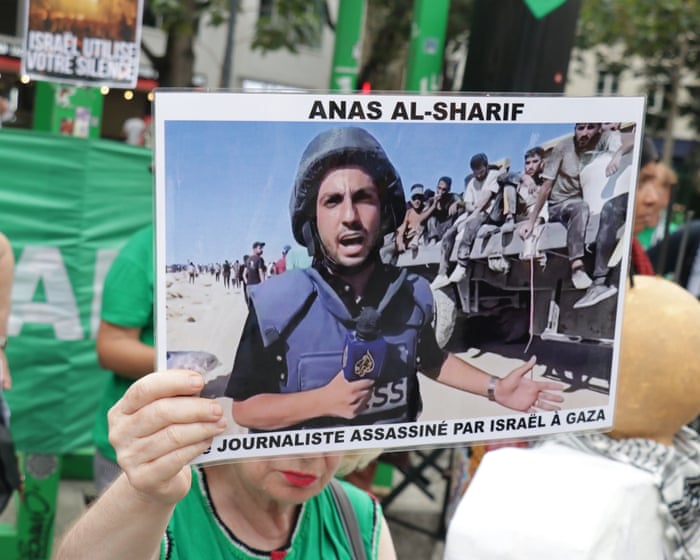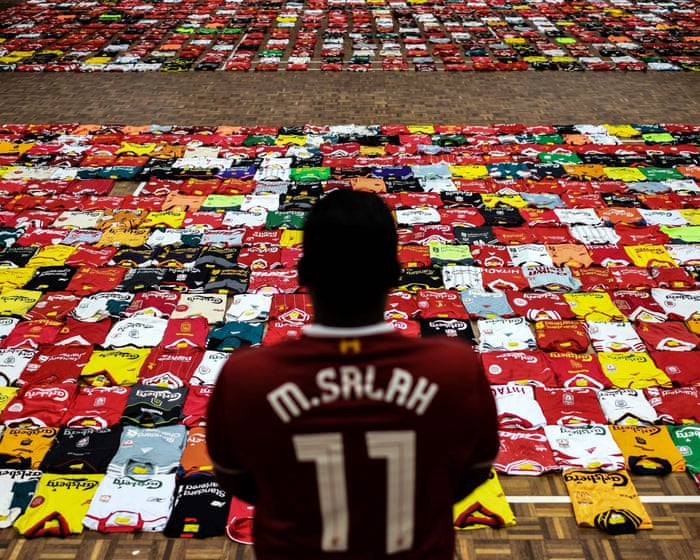For nearly two years, Israel has been systematically targeting and killing Palestinian journalists in Gaza. On Sunday night, the Israeli military killed six more journalists who had been sheltering in a media tent in Gaza City. Among the victims was 28-year-old Al Jazeera correspondent Anas al-Sharif and his colleagues reporting from the besieged territory.
Israel faces no consequences for these killings, thanks to unconditional military and political support from the U.S. and other Western powers—and the silence of many Western media organizations that refuse to defend their Palestinian colleagues. While these outlets loudly condemn governments like Russia, China, or Iran for harassing or imprisoning journalists, they stay largely quiet when Israel, a U.S. ally, does the same.
This hypocrisy has been exposed since Israel intensified its attacks on journalists after Hamas’ October 7, 2023, assault. Under international law, journalists are protected as civilians, and deliberately targeting them is a war crime. According to the Committee to Protect Journalists (CPJ), 192 journalists have been killed since October 7—184 of them Palestinians killed by Israel. At least 26 were deliberately targeted for their work, though the CPJ couldn’t confirm if others were also killed for being journalists.
Other estimates are even higher. A recent study by Brown University’s Costs of War project found that at least 232 media workers had been killed by late March. Shockingly, more journalists have died in Gaza than in the U.S. Civil War, both World Wars, the Korean War, the Vietnam War, the wars in Yugoslavia, and the U.S. war in Afghanistan—combined.
You’d expect such staggering numbers to spark global outrage among journalists and news organizations. Yet U.S. media has largely stayed silent, unlike their vocal campaigns to free reporters like Evan Gershkovich, the Wall Street Journal correspondent detained in Russia. Major outlets framed Gershkovich’s case as wrongful detention and a sham trial—but they rarely extend the same concern to Palestinian journalists facing Israeli threats.
Israel had been targeting al-Sharif for months before his death. In November 2023, he reported receiving calls from Israeli military officials ordering him to stop working and leave Gaza. A month later, his 90-year-old father was killed in an Israeli airstrike on their home.
Israel then smeared al-Sharif, calling him a “terrorist”—a tactic it has used against other Palestinian journalists it later killed, without providing evidence. In October 2024, the Israeli military accused al-Sharif and five other Al Jazeera journalists in Gaza of being current or former members of Hamas or Palestinian Islamic Jihad. Al Jazeera and press freedom groups saw this as a potential death sentence—one of the six was killed by Israel in March.
The smear campaign intensified last month after al-Sharif’s reporting on Israel’s siege and starvation tactics in Gaza went viral.During one broadcast, journalist Anas al-Sharif broke down on air as a woman collapsed from hunger behind him. (After spending six weeks in my home country, Lebanon, where I frequently watched Al Jazeera’s coverage, it was clear that al-Sharif had become the defining voice of the Gaza war for millions across the Arab world.) The Committee to Protect Journalists (CPJ) was so concerned by Israeli threats against him that it issued a statement last month expressing “grave worry” for his safety and calling for his protection.
Israel is wiping out Gaza’s journalists – and it’s no longer even hiding it | Jodi Ginsberg
[Read more]
Yet these appeals have largely gone unheard in most U.S. and Western newsrooms. Unlike the outpouring of support for journalists like Evan Gershkovich—targeted by U.S. adversaries—there have been few campaigns or statements of solidarity with Palestinian journalists. Major U.S. outlets have not published open letters demanding protection for journalists persecuted simply for doing their jobs, as the New York Times, Wall Street Journal, and Washington Post did for Gershkovich in May 2024 on World Press Freedom Day.
It seems press freedom and protection from persecution only apply to Western journalists.
In 2022, Shireen Abu Akleh, a prominent Palestinian-American correspondent for Al Jazeera, was killed by an Israeli soldier while reporting in the West Bank. Despite this, the Biden administration refused to hold Israel accountable. This inaction only emboldened Israel’s sense of impunity. If Israeli leaders faced no consequences for killing one of the Arab world’s most respected journalists—who was also a U.S. citizen—why would they hesitate to kill more Palestinian journalists in Gaza?
Western media has consistently demanded that Israel allow foreign reporters into Gaza—a request Israel has denied since October 2023, except for a few journalists embedded with its military. While this campaign is commendable, it’s also framed problematically. Some Western outlets act as if only foreign journalists can provide impartial coverage from Gaza.
A veteran BBC journalist, John Simpson, recently echoed this sentiment on X: “The world needs honest, unbiased eyewitness reporting to help people make up their minds about the major issues of our time. This has so far been impossible in Gaza.”
This is nonsense—and it perpetuates the colonial mindset that only Western (often white) journalists can be trusted as impartial truth-tellers. It brings to mind Evelyn Waugh’s Scoop, a satire mocking foreign correspondents and sensationalist journalism in the 1930s. Sadly, Waugh’s critique still holds today.
The assumption that Western journalists are the only reliable narrators dismisses the professionalism and bravery of Palestinian journalists, many of whom have died covering Israel’s assault on Gaza. The irony? If foreign reporters ever enter Gaza, most will rely heavily on Palestinian journalists, translators, and fixers—the very people who do the bulk of the work for Western correspondents.
This is the unspoken truth of foreign reporting: it’s built on the unseen, often uncredited labor of local journalists. With no foreign reporters in Gaza, journalists like Anas al-Sharif have been telling their people’s story directly to the world. And Israel is systematically silencing them—while too many of their Western colleagues and international press organizations stay shamefully silent.
Mohamad Bazzi is director of the Hagop Kevorkian Center for Near Eastern Studies at New York University.He is the director of the Hagop Kevorkian Center for Near Eastern Studies and a journalism professor at New York University. Previously, he served as Newsday’s Middle East bureau chief.
FAQS
### **FAQs About Western Journalists Not Supporting Fellow Reporters in Gaza**
#### **Beginner-Level Questions**
**1. Why are Western journalists criticized for not supporting reporters in Gaza?**
Western journalists are criticized because many have stayed silent or underreported on the dangers faced by Palestinian reporters in Gaza, where over 100 journalists have been killed. Critics argue they should use their platforms to demand better protection for their colleagues.
**2. What risks do journalists in Gaza face?**
Journalists in Gaza face bombings, shootings, censorship, and threats while covering the war. Many have been killed, injured, or displaced, often without international media demanding accountability.
**3. Have any Western journalists spoken up for Gaza reporters?**
Some have, but not enough. A few, like Christiane Amanpour and Mehdi Hasan, have highlighted the issue, but many major news organizations avoid strong advocacy, possibly due to political bias or fear of backlash.
**4. How does the lack of support affect reporting from Gaza?**
It leads to fewer firsthand accounts, more censorship, and an incomplete story. If journalists in Gaza aren’t protected, the world gets less accurate information about the war.
—
#### **Advanced-Level Questions**
**5. Is there a double standard in how Western media treats journalists in Gaza vs. other conflict zones?**
Yes. When Western journalists are harmed, there’s outrage. But Palestinian journalists’ deaths often get minimal coverage, suggesting bias in whose lives are deemed “newsworthy.”
**6. Do Western news organizations have a responsibility to protect journalists in Gaza?**
Yes. International press freedom groups say media outlets should advocate for all journalists’ safety, not just their own staff. Staying silent normalizes the targeting of reporters in Gaza.
**7. How does political bias play into this issue?**
Some Western outlets avoid criticizing Israel due to government pressure, advertiser influence, or fear of being labeled “anti-Israel.” This leads to weaker support for Palestinian journalists.
**8. What can Western journalists do to help their colleagues in Gaza?**
They can:
– Report more aggressively on attacks against Gaza journalists.
– Pressure governments to demand accountability.
– Collaborate with Palestinian reporters to amplify their voices.
**9. Are there organizations advocating for journalists in Gaza?**
Yes, groups like



